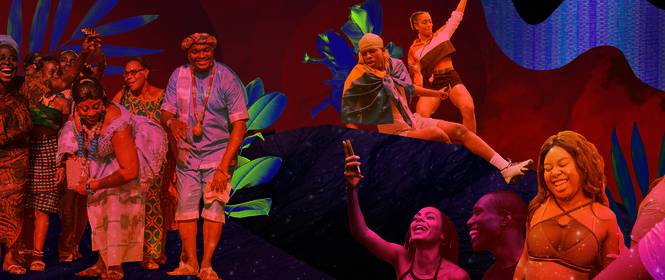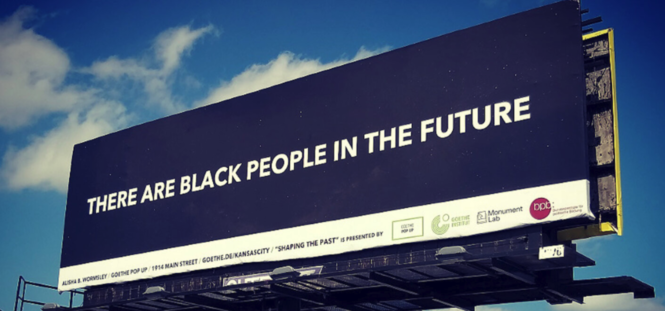Future Now
The IFTF Blog
Freedom Dreaming: Calvin Williams Answers Your Questions on Afrofuturism
How can we think about the future outside the social construct of time? How can we create narratives that imagine new possible realities rather than offer escapist fantasies? Where can you learn more about Afrofutures? On Thursday, August 12th, IFTF hosted a Foresight Talks webinar with Afrofuturist Calvin Williams, Founder of Wakanda Dream Lab, who spoke about freedom dreaming and the methods of Afrofutures (you can find the entire recording here). One hour was hardly enough time to cover the rich and complex topics brought up by the moderator and IFTF faculty Hodari Davis, and our audience. So, Calvin generously agreed to share his responses to a few audience questions which were left unanswered. Read on as Calvin discusses the framework of visionary fiction, organized power, different concepts of time, giving yourself the permission to dream, and more.
How can we bring Wakanda Dream Lab to our curriculums in school?
Some of my favorite experiences have been facilitating worldbuilding workshops in augmented reality with young people!
Wakanda Dream Lab provides resources and program offerings for various audiences including school aged youth (for example, our workshop with Alliance for Girls - Freedom Dreams: Radical Safety From Our Home to the Streets) and post-secondary students (for example, Pacific School of Religion Living Democracy: Art & Culture). We host design labs, hackathons, and workshops that invite participants to immerse themselves in worldbuilding and visionary solution-making, organizing strategies based in the practice of Afrofuturism and Radical Imagination. Feel free to contact us or join our newsletter for updates on open invitation workshops.

In your view, what differentiates narratives that are escapist fantasy from narratives that actually open up new possibilities? Is it in the narrative or in the viewer/reader/listener?
I credit my thinking on this to three brilliant cultural strategists who I’m very fortunate to be able to call my friends.
Through “Octavia’s Brood: Science Fiction Stories From Social Justice Movements,” (2015) Walidah Imarisha and adrienne maree brown introduce the powerful form of speculative practice they call “visionary fiction” which begins with a matter-of-fact assertion that Walidah Imarisha quotes from the poet Lucille Clifton: You cannot create what you cannot imagine.
Walidah defines visionary fiction in this way:
We started the anthology with the belief that all organizing is science fiction. When we talk about a world without prisons; a world without police violence; a world where everyone has food, clothing, shelter, quality education; a world free of white supremacy, patriarchy, capitalism, heterosexism; we are talking about a world that doesn’t currently exist. But collectively dreaming up one that does means we can begin building it into existence.
And as my Wakanda Dream Lab co-founder, Terry Marshall, likes to remind audiences in his worldbuilding workshops, “we are living in an imagination battle. If you can’t imagine your freedom, then you will never achieve it.” That is, if this world is the fruition of an imagined dreamworld, then why not our own? And if we are not ultimately the ones defining the terms of our Freedom Dreams, then who is? That is why we must contend for our dreamspace, give ourselves the permission to dream, and be in the practice of Freedom Dreaming as a form of power. [I speak about this with adrienne and Walidah in the Emergent Strategy podcast episode, “Dreaming While Black,” (April 2021)].
I believe that visionary fiction offers a framework for narratives that intentionally imagines new possibilities for more just, joyful futures while also inviting the reader to explore the organizing power to make that possibility into an irresistible material reality. In workshops with Wakanda Dream Lab, I invite movement builders to reimagine themselves as worldbuilders for an irresistible future that must exist for us to exist abundantly in that future. In fact, it’s an invitation to Dream + Create + Live that future; that is, to imagine liberatory possibilities, to curate a liberatory narrative for those possibilities, and organize an immersive experience of a storyworld in that liberatory narrative. Wakanda Dream Lab released three visionary fiction anthologies as part of a series titled “Black Freedom Beyond Borders,” each exploring new liberatory possibilities for just migration, gender futurism and a world without gender violence, and abolitionist futures. The anthologies were co-produced or released with organizing networks supporting campaigns on those respective issues. In the near future, we will explore the intersections of indigenous/ancestral futurism and climate futurism that will invite us to explore the future of built environments, afrofuturist smart cities as the new maroon societies across the diaspora, new forms of bioregional governance and sovereignty (i.e., rematriation and reparations), climate adaptive technologies, indigenous ecological practices of stewardship, etc.
The new stories, storytellers and storytelling platforms that emerge from visionary fiction can offer new possibilities for the cultural shifts that will happen for new political shifts to take root. Each of those waves require organized power and a cultural strategy if our visions are to become more than a narrative of possibility. Power is what makes the possible inevitable; culture is what makes the inevitable irresistible. If we cede the imagination battle that Terry Marshall describes, then how will the current hegemonic power and culture continue to define our “lived narratives” in this existential stage of capitalism in crisis?
As a white privileged person seeking greater racial justice in my majority white community in New Hampshire and excited by Afrofutures, is there a place for white people in Afrofutures? Is this a case where 'white allies' are maybe better situated elsewhere, maybe participatory futures work around racial justice?
If I were a DJ/producer, I would remix this question into “I believe, like Alisha Wormsley, There are Black People in the Future. I LOVE it, and I am HERE for it: So how can I be a co-conspirator for joyful, just and irresistible Black Futures?” How does that question now feel for you? What different ways might you approach this commitment to racial justice within the framework of this remixed inquiry? If you start there, I believe it is what adrienne maree brown would say is “the next most elegant step” towards the answer.

What are some Afrofutures podcasts out there I can explore? Are any of the speakers today doing them? I'm interested in the discussion about Afrofutures, methods, but also actual examples of Afrofutures worlds being built in podcasts.
I would be remiss if I didn’t mention that right after the IFTF Foresight Talks webinar I recorded an interview for “Black Sci-Fi: Stories From the End of the World,” hosted by Walidah Imarisha on BBC Radio 4. This podcast documentary is available through October 4, 2021.
I also made an ever-evolving podcast playlist of some of my favorite episodes, podcasts, and audio documentaries discussing Afrofuturism. The bad news is that I feel like my playlist is 25% complete. The good news is that it is an ever growing field and we may always be at the learning edge of 25%. So that said, feel free to follow my playlist “Afrofuturist Storyworlds” on Spotify for some of my favorites — and feel free to add to it!
A few of my favorites are listed (Ytasha Womack, Rasheeda Phillips, Moor Mother, Reynaldo Anderson, Kodwo Eshun, Walidah Imarisha, Lola Olufemi, Kimberly Drew and Jenna Wortham - or recordings of Sun Ra and Octavia Butler) but many more are not available on Spotify - but if you start there I’m sure it will offshoot into the many branches and roots of Afrofuturism.
I agree that time is a colonial construct, but then isn't the idea of a future? How do we do futures work outside of a frame of time?
I can’t overstate how much I love this question. I’ve been interrogating this as well, and have been playing with various forms of this question including:
What if the colonial construct to navigate time were the barrier to understanding time in similar ways that the Greenwich Time Meridian distorted modern cartography and geography (Decolonial Atlas has a lot of fun with this field of study)?
Why don’t I reclaim my time like Rep. Maxine Waters?
What if reparations were a time heist?
What do indigenous practices, mathematics, and physics contribute to our interpretations of time?
What I can offer are several areas of study I am turning towards so I can sharpen my inquiry and approach to these shared questions.
I have been studying various cultural signifiers, symbols, and stories of time/timespace rooted in West African cultural traditions. In particular, I’ve been interested in the Adinkra symbols developed in the Akan culture of the Asante peoples (present day Ghana and Ivory Coast). I strongly recommend “The Adinkra Dictionary: A Visual Primer on the Language of Adinkra,” by W. Bruce Willis.
The Mmere Dane symbol embodies both the literal translation “time changes” as well as the proverb for understanding the dynamism of time, and our relationship with/within time:
Mmere dane a, ye dane ye ho bi. | If times change, we change ourselves too.
(Bu Me Be: Proverbs of The Akan, Appiah & Agyeman-Duah, 2007).
The symbol itself resembles a simple pictogram of an hourglass: two vertically mirrored triangles separated by a horizontal line, all encased within a circle. However, if the symbol is interpreted as a “visual transliteration” for the dynamism of time, another really interesting connection is found: The Mmere Dane symbol closely resembles the “light cone” diagram that depicts spacetime within theories of relativity (attributed to Albert Einstein and Hermann Minkowski, among others). This diagram gives insight into the concepts of simultaneity of time, time dilation, and spacetime causality — special concepts relating to the dynamism of time that can be found within Afroindigenous traditions, but often reduced to “cultural mythology” rather than astrophysics and theoretical cosmology.
My hope is that the field of futurism does not do the same with Afrofuturism (or the broader field of Black Speculative Futures). So those in the field futurity must absolutely study and learn from the contemporary methodologies of Black Feminist Futurity (see Black Quantum Futurism, Moor Mother, and Rasheedah Phillips); and also, must study and learn from ancestral futurism from indigenious practices like the Adinkra symbols from the Akan culture. In doing so, we are embodying one of the Adinkra proverbs interpreted as a Sankofa bird looking back to hold her egg while her feet stayed forward:
Se wo were fi na wosankofa a yenkyi. | It is not wrong to go back and fetch that which you have forgotten.
All that to say — there are various fields of study that address futurity beyond the concept of a linear or singular time construct. I believe that Afrofuturism invites us to explore time as a technology for interrogating possibilities; and in doing so, we are practicing the reclaiming of time.
(In another conversation, I’ll explore the studies of “time outside of time” through music theory, indigenous time signatures and jazz improvisation as inspired by the Coltranes, Sun Ra, among others).



